Losing a child is a devastating experience that no one should have to endure. The San Francisco Child Death Review Team works to develop ways to provide the surviving family and community members with resources to support them during this difficult time. This team has recently published a new pamphlet of resources that offer support and guidance for those navigating the complex journey of grief and loss.
CDRT was established under California Law to assist local agencies in identifying and reviewing unexpected child deaths and facilitating communication between agencies and organizations. For San Francisco City and County’s Child Death Review Team, Safe & Sound works with several agencies:
San Francisco’s CDRT recognized the need for families to have one, combined, easy to navigate source listing resources following a tragically fatal event. The newly published pamphlet collates the organizations within the City and County of San Francisco which provide practical or emotional services to support those navigating the difficult journey of losing a child. The pamphlet is designed to be shared with families by medical investigators, nurses, and hospitals.
Safe & Sound prepared the pamphlet for the CDRT to further the team’s role of supporting both the families, and the community of organizations providing these essential resources.


The first five years of life mark a critical time for childhood development. Early experiences and relationships with caregivers shape the architecture of a developing brain and lay the foundation for mental health across an individual’s life.
The American Academy of Pediatrics has recently released a clinical report, (published in the September edition of Pediatrics), endorsing preventive pediatric screenings for mental health, emotional, and behavioral concerns and offering providers additional clinical guidance to support their practice.
However, these endorsements can only have value if there are the providers available to deliver them. The need for these mental health roles has never been greater.
Despite the recognized importance of mental health in early years, the mental and behavioral health needs of infants, toddlers, and young children are often overlooked.
California has started to increase investment and launch initiatives in mental health for older children, but state and local governments are yet to do more to ensure we meet the mental health needs of California’s youngest, particularly as recent changes in mental and behavioral health funding through Proposition 1 and the Mental Health Services Act may soon impact the availability of community-based prevention and early intervention services.
First Five Center for Children’s Policy issued a report last year highlighting a concerning mental health provider workforce shortage impacting the nation and our state.
Some key findings highlighted in the report:
This shortage is particularly acute for providers serving specific sub-populations of California children, such as children in Medi-Cal, infant and toddlers, and for providers that are culturally and linguistically relevant for the diverse population of children in the state. First Five Center for Children’s Policy’s Brief proposes several key recommendations for state leaders which aim to address the critical shortage of IECMH providers, improve access to mental health services for families with young children, and reduce the inequitable impacts of the current system.
Subsequent data released by the California Department of Health Care Access and Information further emphasized these findings, explaining that in 2025, all 58 counties are projected to face a shortage across all behavioral health roles examined, and that the challenges facing mental health workforce supply and demand are projected to persist through to 2033.
In order to meet these needs, Safe & Sound works to build the system of care for children and families in San Francisco and beyond in a number of different ways.
Often, in the absence of a mental health provider, peer support is essential. Safe & Sound, as the backbone agency of the Family Services Alliance (FSA), is piloting ways to increase the number of family support providers that are reflective of their community and able to offer this peer support. By partnering with Community Health Worker training programs we can ensure that experienced community members get valuable training in peer support and then are placed within trusted Family Resource Centers. They could then undertake tasks such as mental health screenings that could be an early indicator of mental health issues requiring further support, navigation to resources and mental health education.
Where mental health providers are available, the FSA is working to strengthen the connections between these providers and family support services so that a family’s holistic needs can be met. Without access to basic needs such as shelter or food, it is difficult for a family to address trauma, anxiety or depression in therapy, lessening the value of mental health support. Safe & Sound and the FSA work to ensure that families’ basic needs are provided for both directly, and by increasing connections and advocating for more resources for families.
The Center for Youth Wellness, a program of Safe & Sound, works with pediatric clinics nationwide to support the introduction and implementation of ACEs screenings, and to ensure that children who have a high ACEs score are referred to Enhanced Care Management where they can receive a high level of case management.
And finally, Safe & Sound’s clinical care team based at both of our San Francisco locations provided 1,068 therapy sessions in 2024 for children and caregivers in our community. Through therapeutic play, our clinicians support families to have the tools they need to thrive.
Safe & Sound collaborated with Support for Families, a fellow member of the Family Services Alliance, of which Safe & Sound is the backbone agency, to provide a Spanish-language workshop specifically for caregivers wanting to understand more about Special Education.
Support for Families helps Bay Area parents of children with disabilities access free resources, support, and guidance. This special workshop for parents and caregivers of children with special needs enabled caregivers to connect, learn, and feel more supported and confident in supporting their child’s education.
The workshop covered:
Individualized Education Program (IEP) is a legally binding, written plan for students with disabilities that details specialized instruction, related services, goals, and accommodations to ensure they receive a Free Appropriate Public Education (FAPE). Mandated by the federal Individuals with Disabilities Education Act (IDEA), the IEP is collaboratively developed by a team including parents, educators, and specialists to address the student’s unique needs and track their academic and functional progress.
The workshop had a very high turnout showing a real need for this information amongst our community of families. Caregivers were able to bring their children to our Therapeutic Playroom while they attended the workshop, allowing them to focus on the content.
This workshop was one of a number of new initiatives by Safe & Sound to expand our services for local families to meet their specific needs.
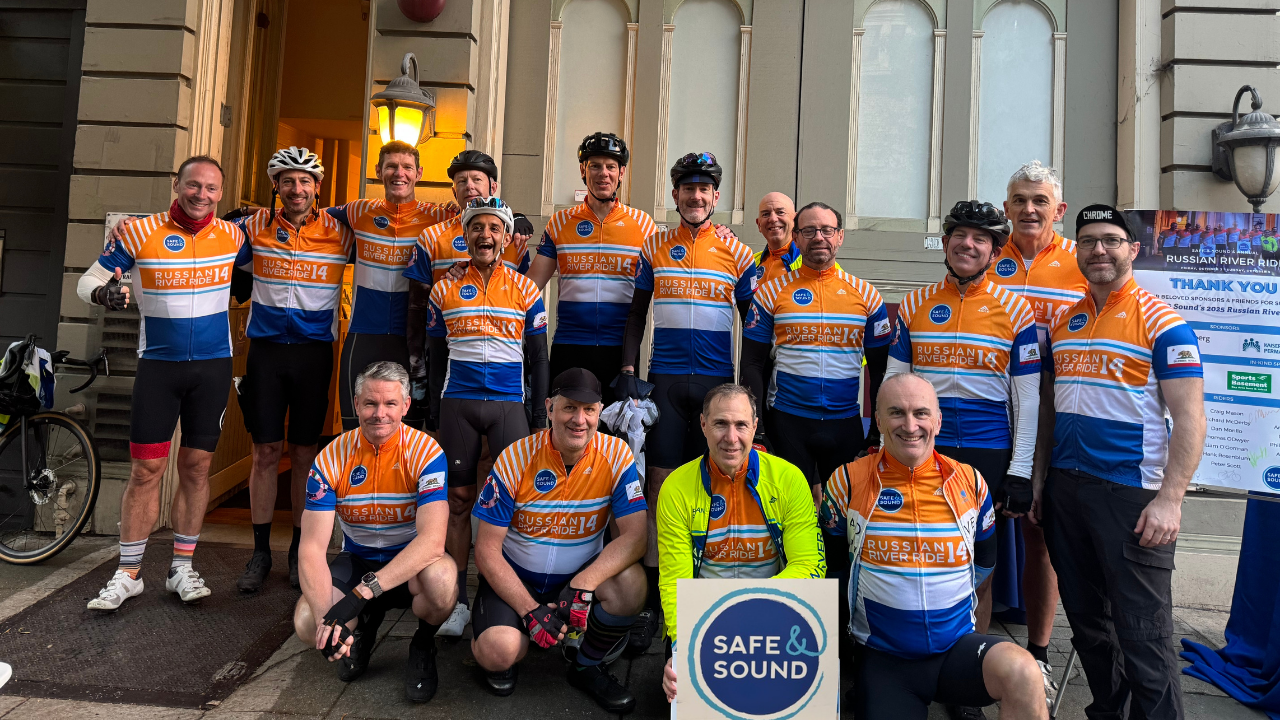
The Russian River Ride is a three-day, 200-mile cycling challenge from San Francisco to the Russian River and back, led by a dedicated team of cyclists riding for children and families. Now in its 14th year, this fundraiser has grown from a small group of friends passionate about Safe & Sound’s mission, into a powerful movement—with cyclists coming together year after year to push their limits and raise awareness and critical funds for Safe & Sound. This year, the riders have already raised $89,000 and are still fundraising, fueling essential programs that protect children and support families.
The event took place last weekend, with our riders setting off from our Waller Street office in Haight Ashbury on Friday, October 3rd and returning on Sunday, October 5th.
Our riders travel with purpose—spreading the message that every child deserves to grow up safe, loved, and supported, and helping fuel the essential work of Safe & Sound across San Francisco and beyond.
Every mile our 2025 team rode—and every dollar you give—helps build a future where children are protected and families are empowered. We offer our heartfelt thanks to all those who took on the challenge and those that supported them. If you haven’t yet donated to support the riders it’s not too late! Donate today so we can build a future with safe kids, strong families & sound communities, together.



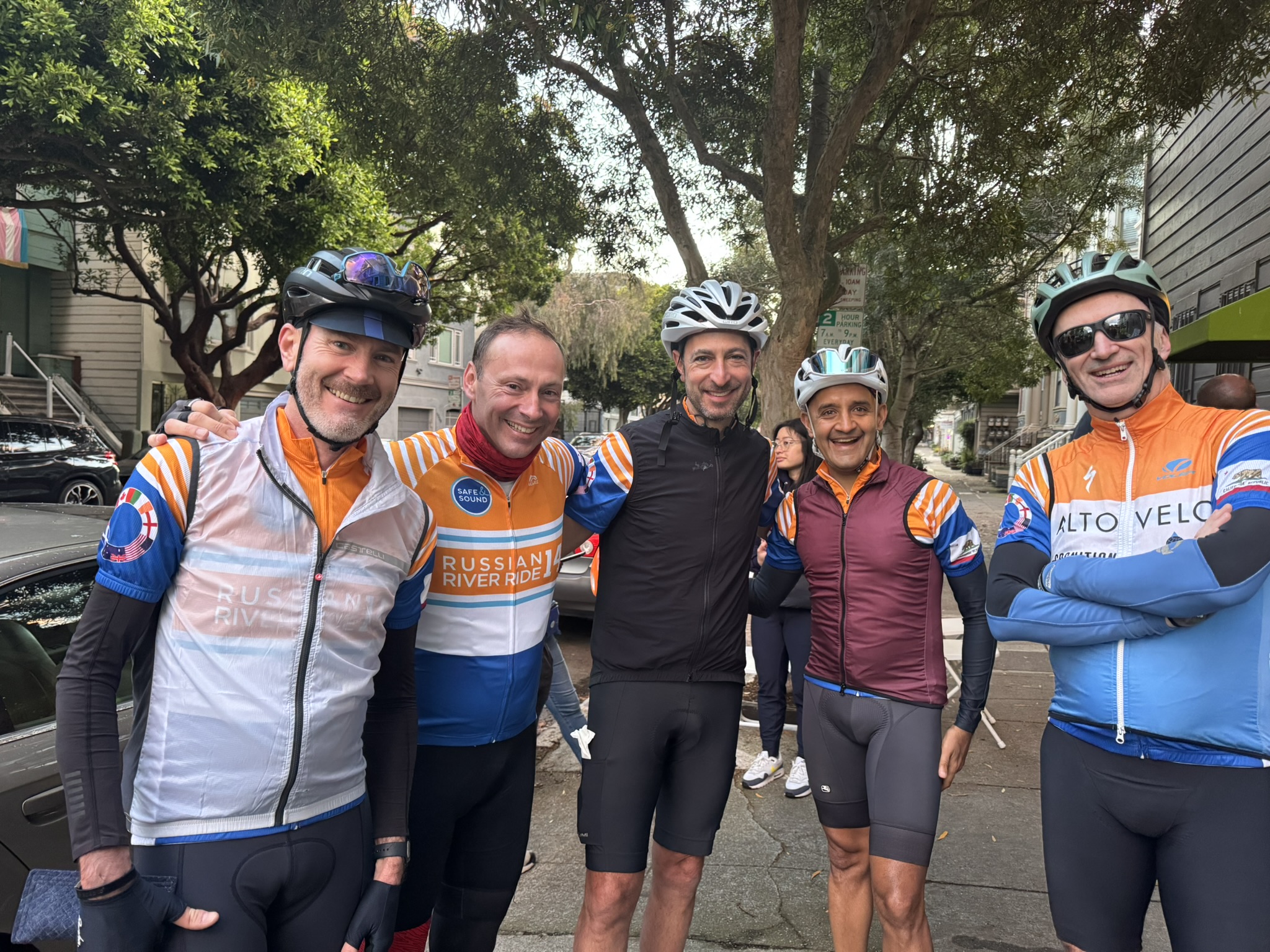
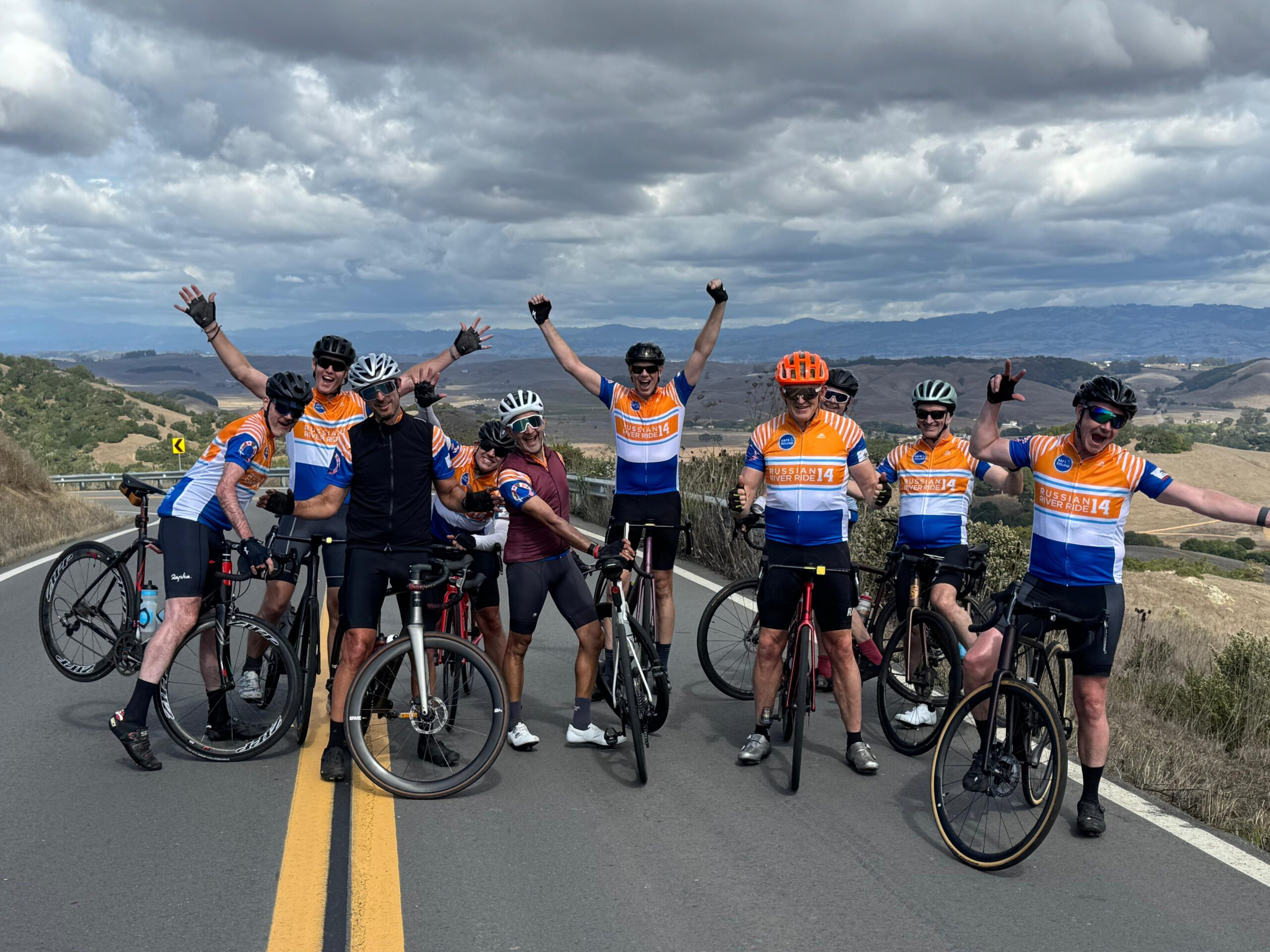
Hosted by Prosperity Initiative and Family Services Alliance, of which Safe & Sound is the backbone agency, the Children, Youth & Family Summit will bring together nonprofit leaders, City officials, foundation partners, and community members to strengthen the future of San Francisco’s children, youth, and families.
Safe & Sound sits at the center of a network of dozens of organizations in San Francisco that comprise a web of support for local families. And through our research and advocacy, we work to understand and develop solutions to systemic problems faced by families across California and beyond. The goal of the event, in line with the goals of both the Family Services Alliance and Safe & Sound, is to strengthen coordination across nonprofits, City government, and private philanthropy to provide the stability and support families need. We do this because every child has the potential to grow into a happy and healthy member of their community.
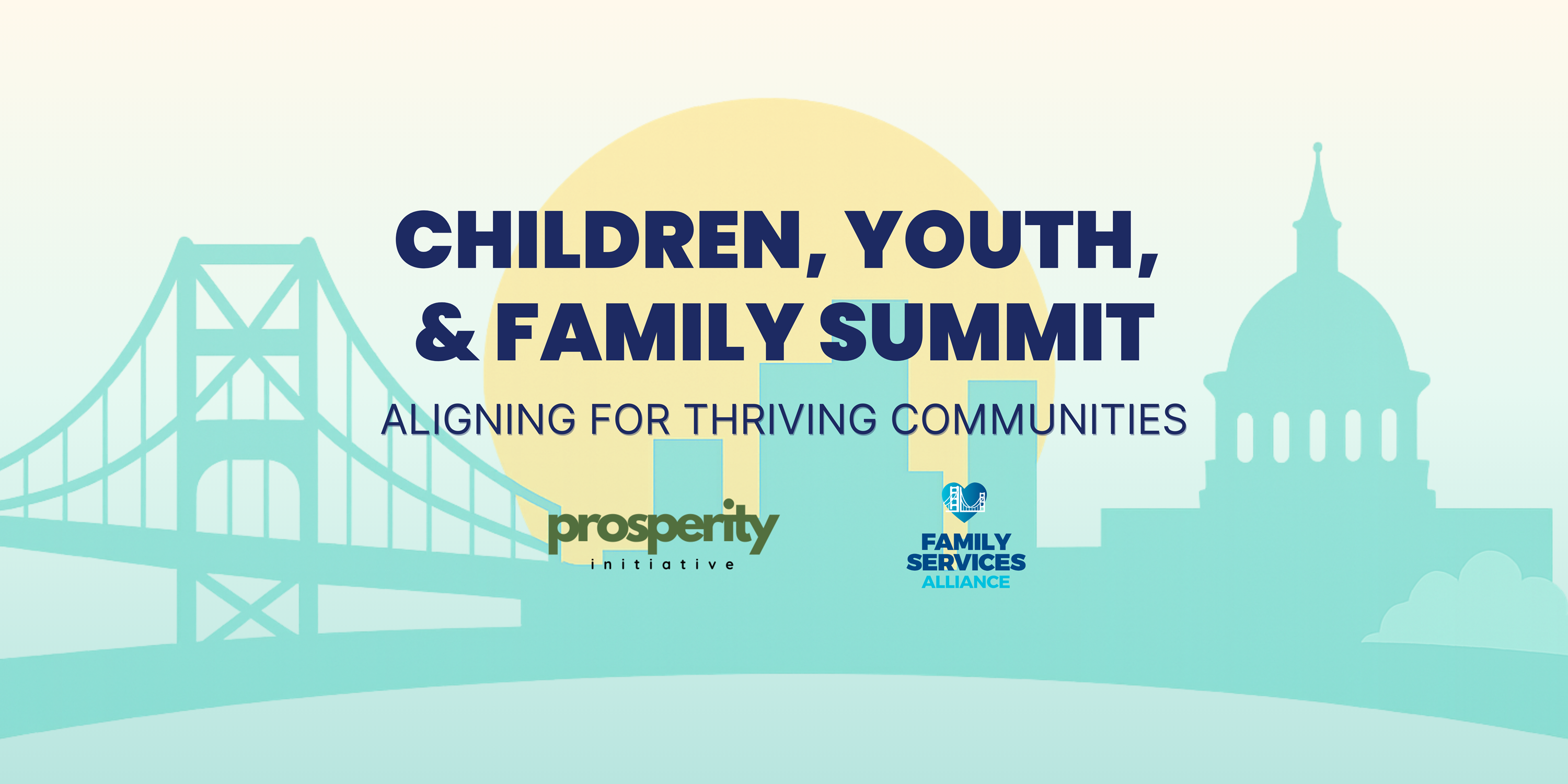
This first-of-its-kind convening will highlight the vital role that youth- and family-serving organizations play in our communities and feature honest, solutions-driven conversations focused on how we can build a more coordinated, sustainable future for San Francisco’s children, youth, families, and the workforce that supports them.
Date: Friday, November 7, 2025
Time: Doors open at 9:45am | Program 10am-3pm
Location: In person at UC Law San Francisco, 198 McAllister St, San Francisco, CA 94102
Further information: Visit the dedicated event website online.
Tickets: Available via Eventbrite
This event is relevant to:
The program will feature:
Dr. Pegah Faed, CEO of Safe & Sound, joined The Four to talk about our decades-long work preventing child abuse and addressing trauma through services and advocacy in San Francisco.
Pegah shared information about our services that strengthen families in their communities and work to prevent abuse and trauma. As a trusted resource in the community for over 50 years we meet families where they are to orffer the support they need to thrive.
The interview also touched on how crucial the support of our donors is, and provided details of our upcoming Blue Ribbon Celebration – you can see more online here.
This year, 150 local children across San Francisco started school with the tools they need to learn and thrive—all thanks to you.
Children across San Francisco are settling back into their classes for the Fall term ready to learn. However, for some, the school year began at a disadvantage, lacking the necessary supplies, which left them feeling unprepared and left behind.
For families balancing tight budgets, the cost of school supplies can become one more strain at the end of the summer holidays. That’s why we appreciate everyone who contributed to our backpack drive, enabling 150 local children to start the school year with the tools they need to learn and thrive, creating educational equity in our community.
Safe & Sound works with families living in the most vulnerable conditions. Over 99% of the families we serve fall below federal poverty guidelines, with 90% categorized as extremely low-income. Most families we work with have 1-2 children under the age of 12, which means they need new clothes, shoes, and supplies each school year. And nearly 20% of the families face homelessness or insecure housing, making creating a stable school experience for the children all the more important. Providing concrete supports—like school supplies—not only relieves financial stress for hard working parents but increases resilience, and helps families focus on what matters most: their children’s success.
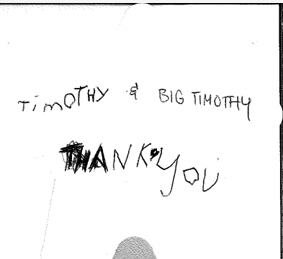
A backpack filled with new school supplies like stationery and water bottles may seem small—but for the 150 children who came to collect their supplies, it was a powerful source of pride, motivation, and joy.
A backpack is more than a school item for kids—it symbolizes belonging, confidence, and possibility. Thank you for bringing that to 150 children this year.
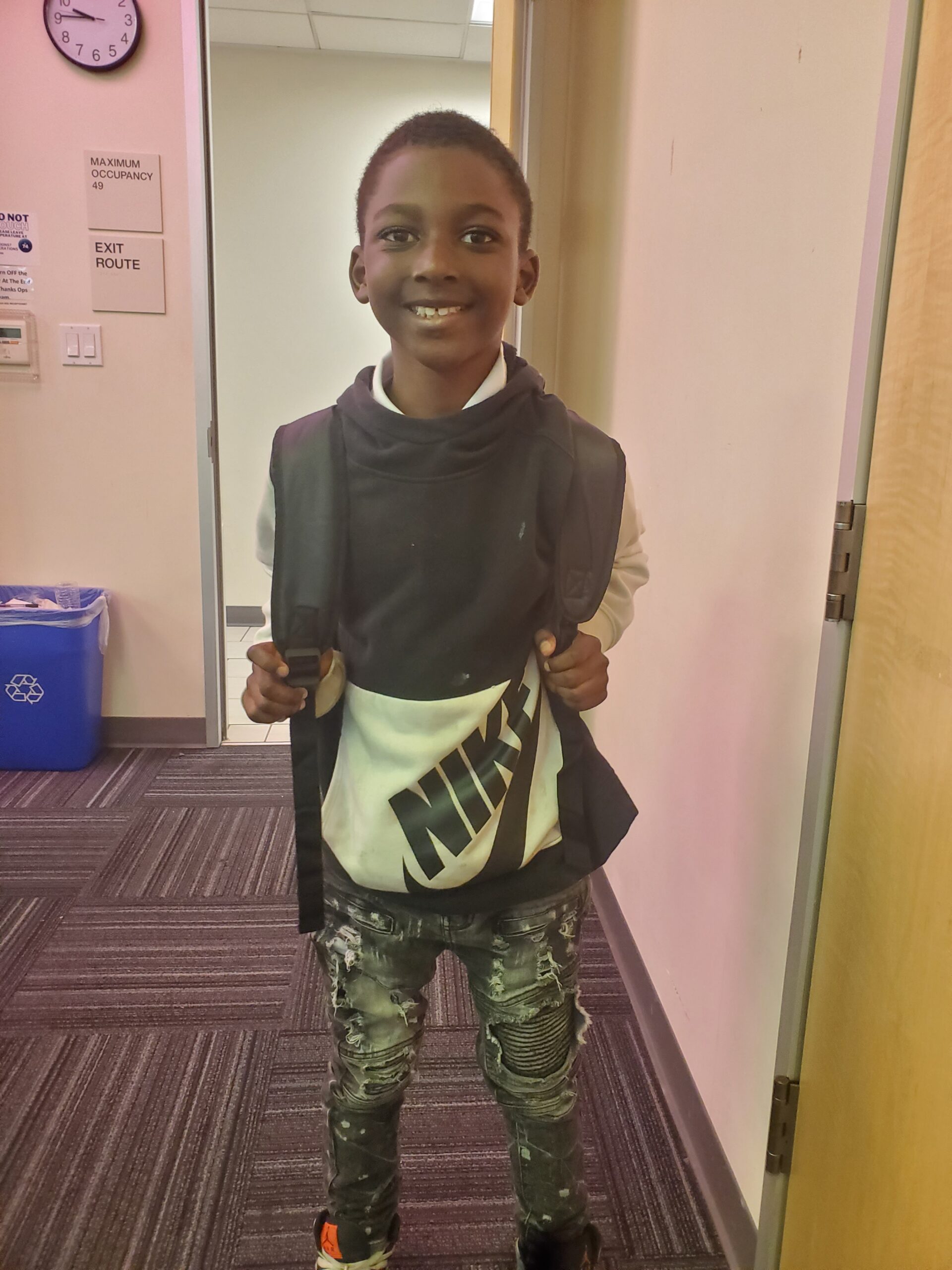
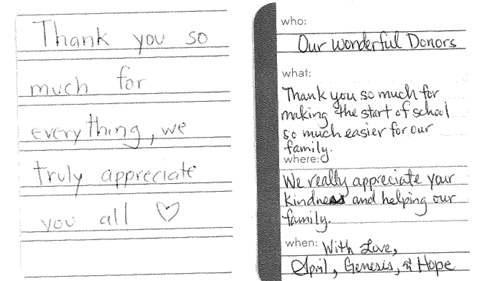
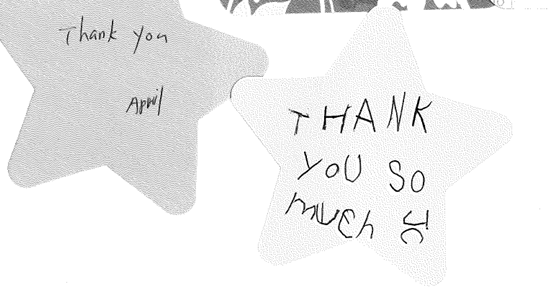
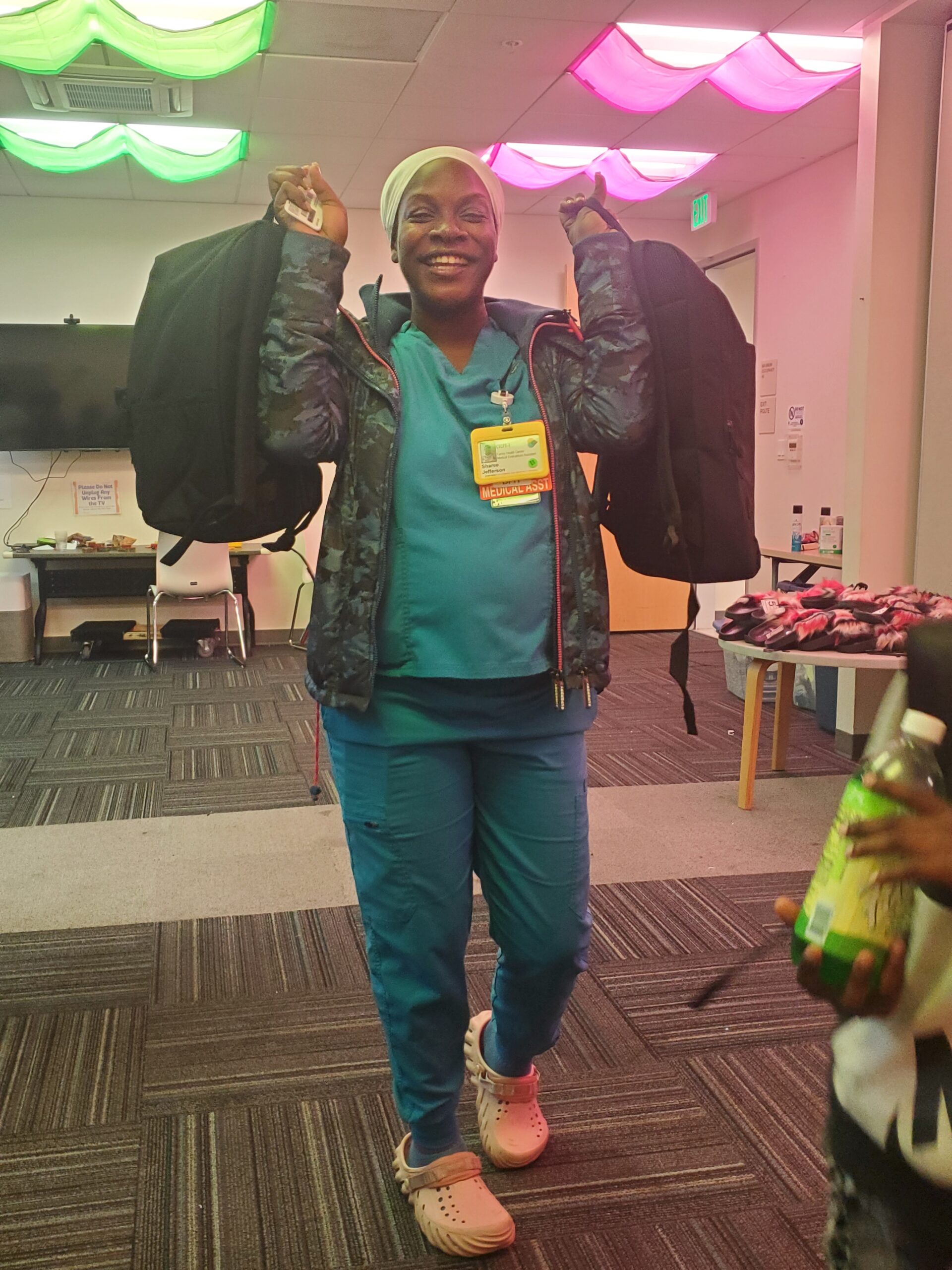

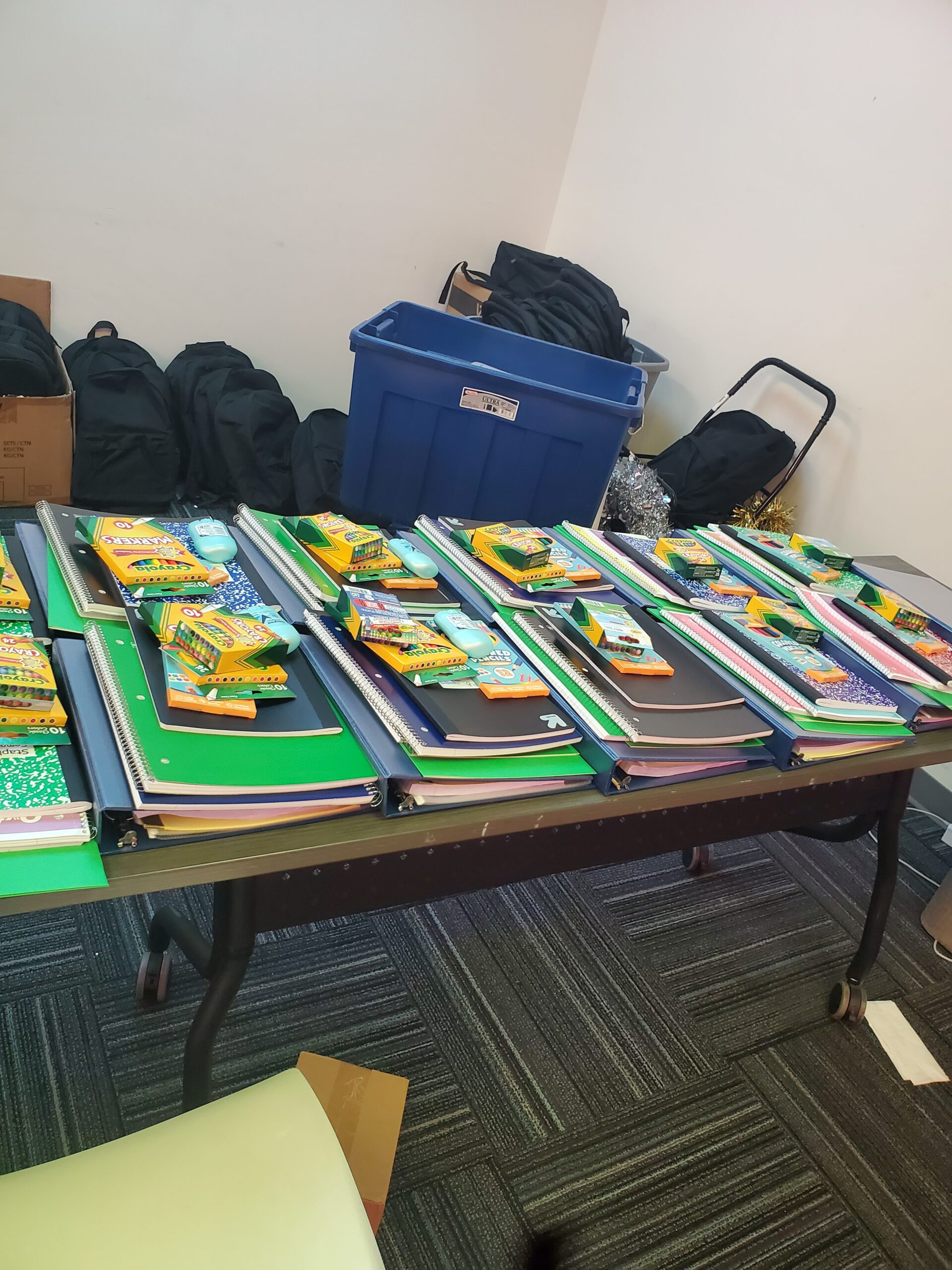
The 5 Protective Factors are areas of family functioning that help support youth and families to be strong. Research shows that when these factors are present in populations of families, it reduces the risk of abuse, maltreatment, and negative outcomes.
Each Protective Factor has its own super power! In this blog series we introduce them all, and explain how they can support your family to thrive.
Grandmaster Granny represents Social Connections. Grandmaster Granny helps build healthy, lasting bonds that create trust and make you feel like you belong. Connecting and creating positive relationships that provide a family emotional, informational, and spiritual support is the goal.
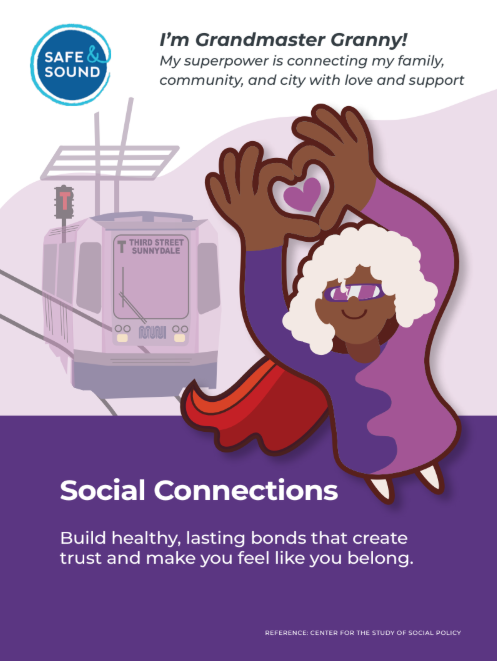
Having a strong net of support is not only comforting but can allow you and your children to rely on a trusted community that can help you come to a solution during tough times.
Why are social connections important?
Making sure every family has a web of support they can count on. When parents feel connected, so will children, making them feel secure, safe and loved.
Grandmaster Granny’s superpowers in action:
🍽️Hosting family dinner
🤝Intentional conversations with your neighbors and friends
💌Checking in on your loved ones
👥Attending community and school groups
🫂Encouraging families to share stories and lift each other up
Finding a community that supports you in your parenting needs is important, as a sense of belonging builds confidence and reduces stress, allowing you and your children to thrive. This is where you can join Safe & Sound to engage in parenting groups and events that allow you to connect! Finding support can be the bridge to the other protective factors and ultimately to finding the right balance for yourself and your family.
—
If you want to know more about how to incorporate each power feel free to call Safe & Sound’s TALK Line or come into Parent Drop In to chat and bring your kiddos to the playroom!
TALK Line: (415) 441-5437
Parenting is hard and you don’t have to do it alone
Parent Drop In:
Monday – Thursday at 1757 Waller Street
Monday at 3450 3rd Street
Read more about it here
Have a look at our Groups and Workshops that are open for enrollment
Read about the other superpower characters in this blog on the 5 Protective Factors
Check out our For Parents section of the website for more resources.
Everyone who supports Safe & Sound has their own story—one that reflects not only how they found us, but why they choose to stay. For Rachel, a longtime TALK Line volunteer and now a valued member of our Board, that connection began more than a decade ago—and it’s deeply personal.
Back in 2010, Rachel had taken the initiative to seek out charity partners for her employer when she first walked through the doors of our Waller Street building. She still remembers the warmth that greeted her—something intangible but unmistakable. “I knew immediately this was a place I’d return to”, she says.
Rachel’s connection to our mission was rooted in her own lived experience. She saw in Safe & Sound a way to honor her mother’s strength and to support families navigating hardship, just as hers once had. What began as a professional partnership soon became something much more meaningful.
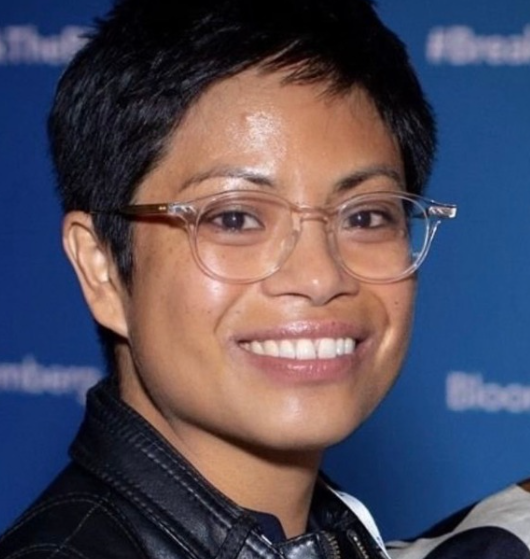
A few years later, in a new role, Rachel found herself wanting to channel her energy into something positive. She thought of Safe & Sound—and took the leap to become a TALK Line volunteer.
The TALK Line—our 24/7 parent support warmline—is often a family’s first step into the Safe & Sound community. It offers real-time guidance, early intervention, and a compassionate ear. Rachel’s empathy and insight didn’t go unnoticed; her training facilitator quickly saw that she had something special. They were right. For the next eight years, Rachel offered calm, consistent support to countless caregivers navigating the ups and downs of parenting.
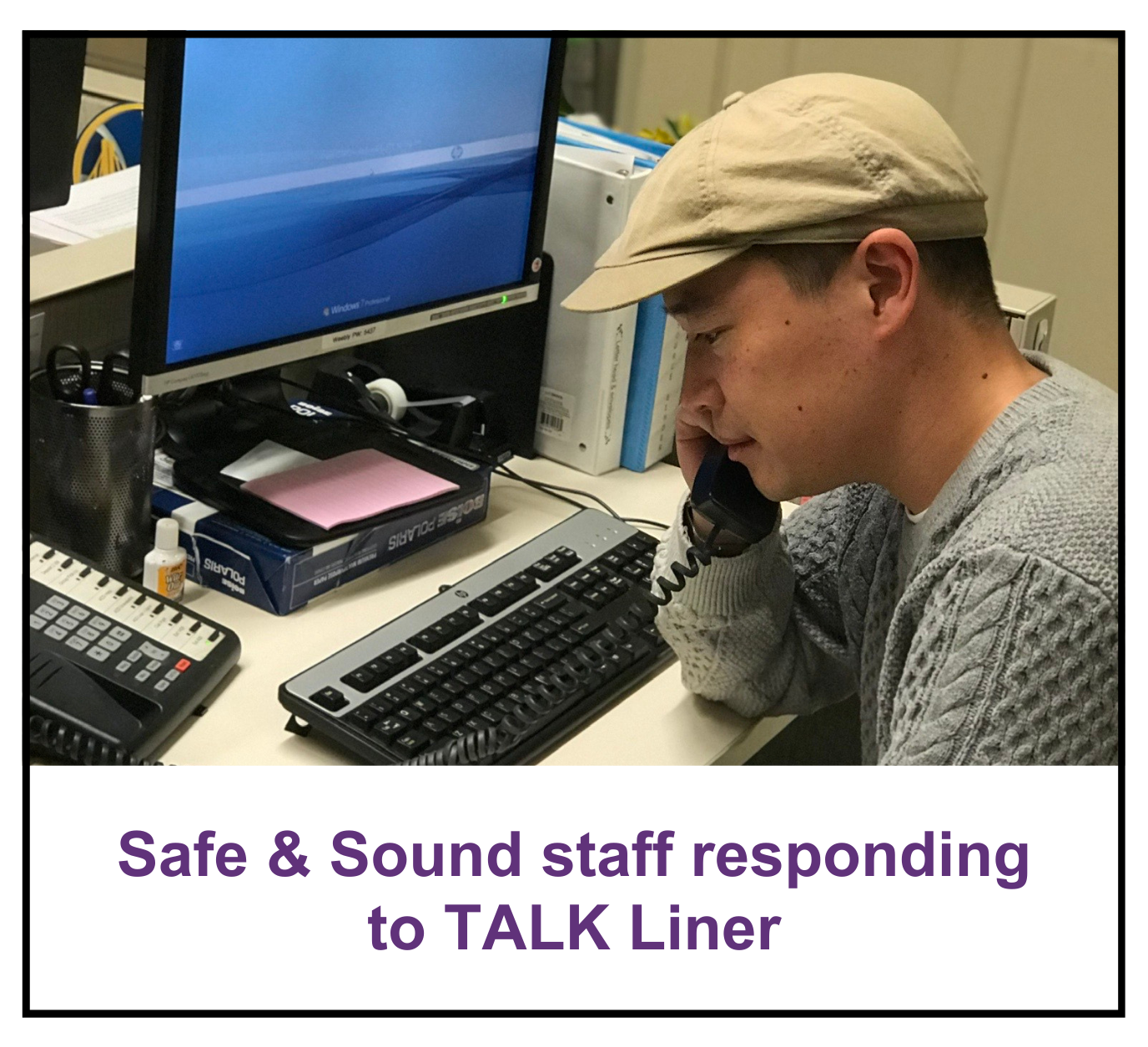
One of those relationships stood the test of time: Rachel connected with a parent when their child was just two months old—and stayed with them over the phone as that child grew into an eight-year-old. It’s this kind of long-term, trusted relationship that reflects the heart of both TALK Line and the Safe & Sound community. For many, the TALK Line is not only a lifeline in moments of crisis, but also a steady source of support and a bridge to engagement with our other programs—whenever families choose.
“Parenting is hard”—that’s the TALK Line’s tagline. Simple. True. And powerful. It’s a reminder that asking for help isn’t a weakness, but a strength. And when stigma is removed, real support can begin.
Today, in her role on our Board of Directors, Rachel continues to champion that belief. Safe & Sound has become more than a place she once visited; it’s part of the fabric of her life. Her story is a reflection of the community we strive to build—one rooted in trust, shared purpose, and a willingness to show up for one another.
Safe & Sound is committed to serving families and communities. One of the ways our Community Partnerships team supports families across San Francisco is through the Communities of Care initiative. At its heart, Communities of Care seeks to unify practices across San Francisco Family Resource Centers by using the Five Protective Factors framework. The Protective Factors are areas of family functioning that help support youth and families to be strong. Research shows that when these factors are present in populations of families, it reduces the risk of abuse, maltreatment, and negative outcomes. The project supports teams to train staff to use the Five Protective Factors framework to plan, implement, analyze and evaluate the effectiveness of their services.
Communities of Care prioritizes a deep engagement with partners and the community, meeting partners and teams where they are and not implementing a one-size-fits-all approach. This has led to a framework that prioritizes adaptation, connection and collaboration as essential, not only to the project, but also as key components of the Five Protective Factors themselves. Over the years, Communities of Care has blended these values to create an initiative that combines support for families with collaborative learning across agencies.
The initiative began in 2020 with funding from the Doris Duke Foundation and facilitation by Safe & Sound. In 2021, fifteen Family Resource Centers in San Francisco joined together in a year of planning, during which partners drafted a Theory of Change and Logic Model, while a group of “Changemakers” adapted the previously published and well-known Protective Factors Survey for potential use by participating agencies. That same year, the first cohort launched with four initial participating Family Resource Centers. In the following years additional agencies joined, four more in 2022 and two in 2023, marking steady growth of the project across the city.
A key idea that came from the early planning work was the creation of a designated collaborative meeting space, thus forming the early concept of the Communities of Care Organizing Hub (CoCO Hub). The CoCO Hub is a unique meeting space facilitated by the Safe & Sound team and shaped by the participants that meet in person on a quarterly basis. This space quickly became the heartbeat of the initiative as it sets itself apart from other collaborative and training spaces with an emphasis on participant collaboration.
CoCO Hub’s uniqueness is in part due to the fact cohort members drive the agenda. The topics that are selected to be discussed often come from requests or questions by the cohort members. The meetings prioritize brainstorming and problem solving between the teams, with occasional input or facilitation from the Safe & Sound team. The activities that are conducted, like creating opportunities for the partners to host an outreach event together, are suggested and led by participating agencies, and trainings provided within the meetings are often suggested by the participants collectively.
In addition, materials are created and updated based on input from participants, leading to exciting opportunities like the creation of the new Five Protective Factors characters. You can read more about these characters in our blog here.
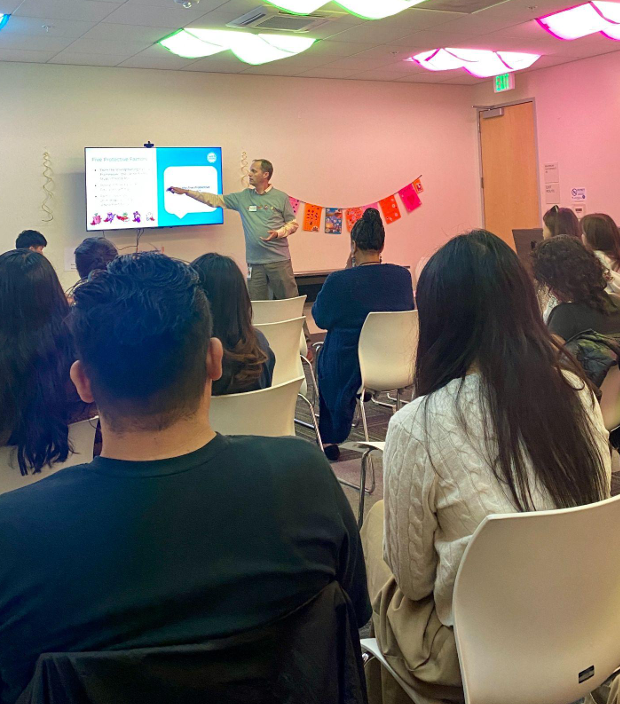
All these elements come together to create a space where Family Resource Centers work together to find ways to bring consistent language, understanding, and training around the Five Protective Factors, thereby continuously refining and unifying how local families experience the web of support across San Francisco.
Feedback from participants over the years has highlighted the community and collaborative feeling that is created through the CoCO Hub. Participants have noted that the space feels “welcoming and very informative” while also providing feedback that they enjoy meeting and building relationships with others in the group. A focus on networking, sharing ideas and resources, and collaborative learning has helped build the CoCO Hub into a meeting space that is vibrant and remains regularly attended.
By creating and utilizing a space that supports implementation and capacity building within agencies, CoCO Hub strengthens the infrastructure that allows Family Resource Centers to deliver effective, strengths-based services to families. What began as a planning effort is now a citywide framework for collaboration, shared learning, and collective impact.